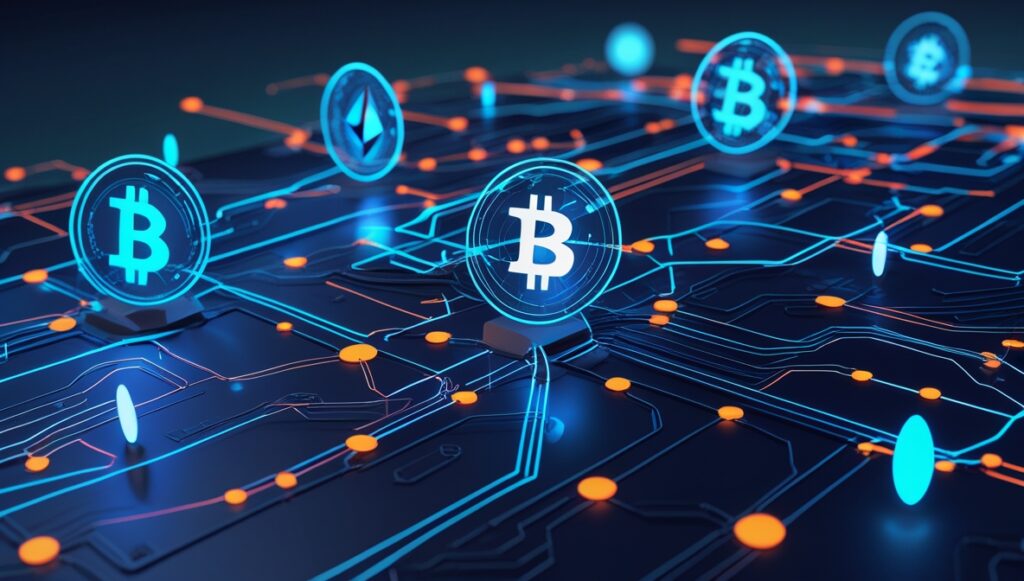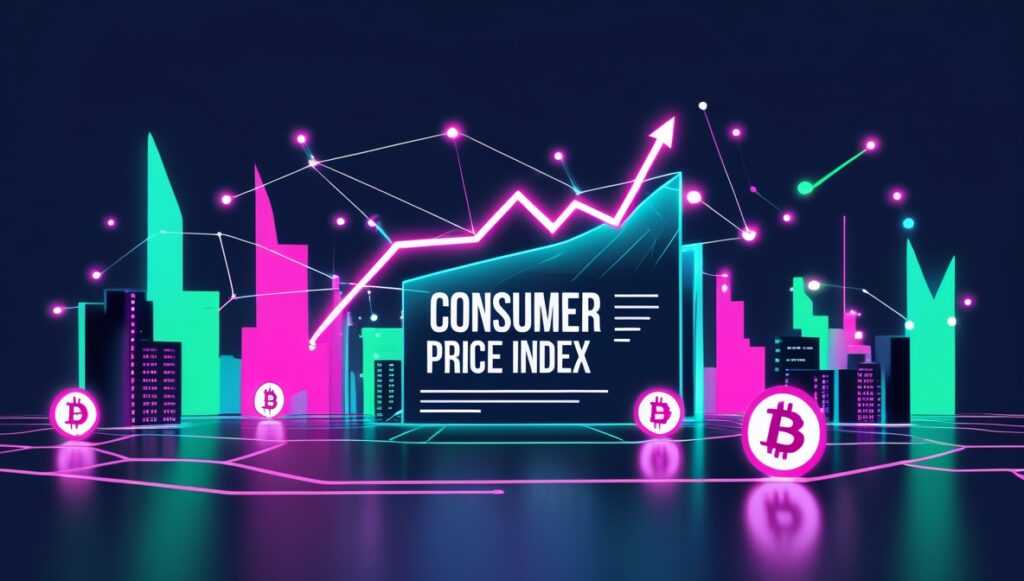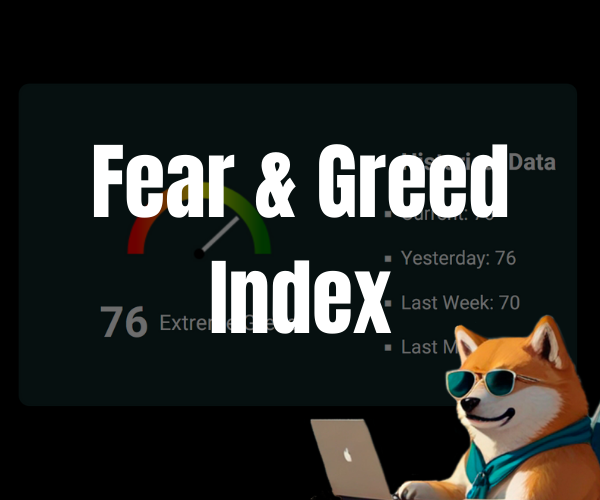Table of Contents
What Is CPI and How Does It Affect Your Wallet and Cryptocurrency? A Simple Guide for Everyone
If you live in the U.S., you’ve probably noticed that prices for gas, groceries, or rent keep changing. Sometimes it feels like your money is “melting away” faster than before. All of this is tied to the CPI (Consumer Price Index). Let’s break down what this means, how it impacts your life, and what it has to do with cryptocurrency.
What Is CPI? Explained in Plain Language

CPI is the “average receipt” for the country. Imagine you buy the same things every month: groceries (milk, eggs, bread), gas for your car, rent for your apartment, medicine and doctor visits. CPI shows the average percentage increase in prices for these goods and services. For example, if CPI rose 5% in 2023, it means life became 5% more expensive over the year. In the U.S., the Bureau of Labor Statistics (BLS) handles this. They track prices across cities to create a national average.
How CPI Affects Your Life
Salary and Savings
- If CPI rises but your salary doesn’t, you’re getting poorer.
Example: In 2022, CPI jumped 9.1%. If your salary stayed the same, you could buy 9% fewer goods than the year before. - Pensions and social benefits are often tied to CPI. If prices rise, payouts increase too.
Loans and Mortgages
When CPI spikes, the Federal Reserve (Fed) raises interest rates to slow inflation. This means:
- Loans and mortgages get more expensive.
- Credit card interest rates go up.
Investments
- Stocks and bonds: Companies may lose profits due to rising costs, hurting stock prices.
- Real estate: Higher mortgage rates can reduce demand for housing.
CPI and Cryptocurrency: The Hidden Connection

Many believe cryptocurrencies like Bitcoin can protect savings when the dollar loses value, citing its limited supply (only 21 million coins) and decentralization (no government/bank control). However, in 2022, U.S. CPI hit 9.1%, yet Bitcoin plummeted 65% as the Fed hiked rates from 0.25% to 4.5%, driving investors to “safer” assets like bonds.
Crypto’s volatility—fueled by news, hype, and fear—makes it an unreliable short-term hedge, though it might preserve value long-term if inflation becomes chronic. When CPI rises sharply, Fed rate hikes hurt crypto: investors favor guaranteed returns (e.g., 5% bonds), and a stronger dollar often pressures prices (e.g., Bitcoin dropped from 48,000 to 16,000 in 2022).
Some crypto projects, like Ampleforth (AMPL)—which adjusts token supply to combat volatility, Nuon (an inflation-tracking “flatcoin”), and Frax Finance (FRAX)—a stablecoin partially backed by inflation-linked assets, aim to leverage CPI data. However, these projects remain niche and complex, unlike mainstream stablecoins (USDT, USDC) pegged to the dollar.
Myths About CPI and Crypto
“If CPI rises, Bitcoin always rises.”
Truth: In 2022, CPI soared while Bitcoin crashed. It depends on Fed actions and market sentiment.
“CPI includes all goods.”
Truth: CPI excludes crypto, stocks, and luxury items. It tracks essentials only.
“Crypto will replace the dollar if inflation surges.”
Truth: That’s fantasy. Even in crises, people rush to the dollar, not crypto.
What to Do If CPI Rises? Practical Tips

For Daily Life
- Demand a raise. If CPI rises 5%, your salary should too.
- Trim your budget. Cancel unused subscriptions (Netflix, Spotify) or switch to cheaper alternatives.
- Use cashback. Cards offering 2-5% back can offset some costs.
For Investors
- TIPS (Treasury Inflation-Protected Securities): Their returns adjust with CPI.
- Gold and real estate: Historically, these protect against inflation.
- Cryptocurrency: Allocate a small portion (5-10%) of your portfolio to Bitcoin or Ethereum—but expect volatility.
For Crypto Enthusiasts
- Track CPI reports. Published monthly on the BLS website.
- Keep some savings in stablecoins (USDC, DAI) to hedge against crypto downturns.
- Avoid projects promising to “beat inflation.” Most are marketing gimmicks.
Real-Life Example: How John Lost—Then Saved—His Money
John from Texas saved $500 monthly in 2021. By 2022, CPI rose 9%, but his salary didn’t. Inflation ate his savings:
- $500 used to cover a week of groceries. Now, it lasted 4 days.
- His rent increased by $200/month.
What John did:
- Switched to a cheaper phone plan.
- Moved some savings into gold and Bitcoin.
- Took on a side hustle to offset costs.
Result: He preserved 70% of his purchasing power, though not without losses.
How Is CPI Linked to Inflation?
CPI is the primary “thermometer” for inflation. It measures how much prices rise for everyday goods and services like food, gas, rent, and healthcare. When CPI climbs consistently over months, that is inflation. For example, if CPI jumps 5% in a year, inflation is 5%, meaning your dollar buys less than before. Governments and central banks (like the Fed) use CPI to decide whether to hike interest rates, adjust money supply, or update social benefits. When CPI spikes sharply—like the 9.1% surge in 2022—it’s a red flag: the economy’s overheating, and it’s time to slam the brakes with policies to cool prices. Bottom line? CPI isn’t just a number—it’s the reason your wallet’s thinning and loans are getting pricier. 💸📉
Conclusion: Why CPI Matters to You
- CPI is a snapshot of your financial health. If it outpaces your income, you’re losing money.
- Crypto isn’t a magic fix. It’s a tool, not a solution.
- Golden rule: Diversify. Spread savings across cash, real estate, gold, and crypto.
Remember: In a world of rising prices, knowledge is your best defense. And don’t believe anyone who says, “Crypto will solve everything”—life’s more complicated than memes. 💸🔍
Sources used to write the article:
Binance
Wikipedia



